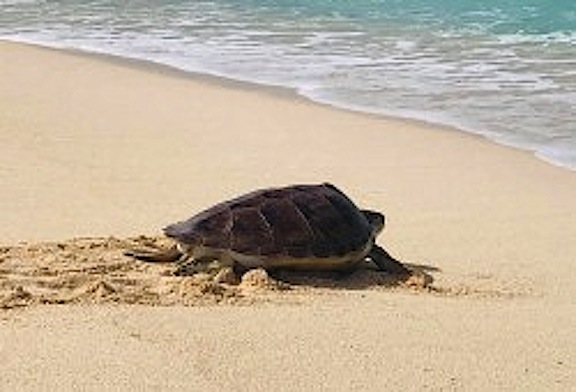Cayman: Governor attends Turtle Centre Release to celebrate World Sea Turtle Day

Cayman Turtle Conservation and Education Centre celebrated World Sea Turtle Day this week with two releases of a total of ten young Green sea turtles. These are known as ‘Head Started’ turtles, because they have been hatched and raised within the safety of the Centre for at least the first, most vulnerable year of their life. One release of five turtles took place on Tuesday 16 June, and the other release, also of five turtles, was on Thursday 18 June. The second release was attended by His Excellency the Governor, Mr. Martyn Roper, who expressed his delight at seeing the turtles begin their new lives in the wild.
“It’s a real pleasure to be here this morning. I’ve been in Cayman now over 18 months and I’ve been a big supporter of the Turtle Centre. It’s such an incredible part of Cayman’s rich history and culture, and I am excited to be here today to see these turtles being released,” Mr. Roper said.
Cayman Turtle Centre CEO Tim Adam said: “This is part of our ongoing programme with over 32,000 turtles released into the wild. As you have probably heard me say before, we now have scientific evidence based on a study under the auspices of the UK’s Darwin Plus initiative, led by the Department of Environment with the University of Barcelona and University of Exeter, that shows that at least 90 percent of the returning nesting turtles in Cayman are related to those that have been released from the Centre, resulting in a steady increase in the number of sea turtles in the wild around the Cayman Islands.”
Mr. Geddes Hislop, the Centre’s Curator of Terrestrial Exhibits and Education Programmes was pleased to answer the Governor’s questions.
“As soon as the turtle hits the water, it is under Department of Environment jurisdiction, and he or she is going to join the rest of the wild population out there, and become part of our natural and cultural heritage,” Mr. Hislop explained.
“That’s Amazing” Mr. Roper said, as “Martyn”, the released turtle named in his honour, disappeared into the waves to begin its new life in the world’s oceans.
Four more turtles, named ‘Jenny,’ ‘Storm,’ ‘Playa,’ and ‘Current,’ were released, one after the other.
‘Head-starting’ is a scientifically proven way of boosting this endangered species’ wild populations because they have already grown to a size and strength big and powerful enough to avoid most predators, whereas when they first emerge as tiny hatchlings in the wild they easily fall prey to a wide variety of fishes and sea birds, and even crabs on the beach before they reach the water.
“We know the release programme works, because over more than 50 years into it now, we know that the released turtles do come back to Cayman to nest. We know that they are successful, and they are breeding out there, and we know that at least 90 percent of all breeding turtles in Cayman can be directly traced back to our programme. The females that come up on the beach to lay their eggs are either ones that have been directly released by us, or they are offspring of ones that have been directly released by us.” Mr. Hislop explained.
This year, even with the necessary precautions surrounding COVID-19 in place the Cayman Turtle Conservation and Education Centre’s Animal Care Team is still hard at work, and its vital conservation programmes, from turtle releases to releases of endangered birds, are all still on-track. Although the public were unable to attend this week’s releases in person, they were streamed live and are still available to view on the Cayman Turtle Centre’s Facebook page.
The Centre’s Animal Care Team has been continuously caring for its 11,000-plus animals since the Centre closed to the public in Mid-March due to COVID-19 restrictions. Members of the public are invited to get involved in the Centre’s conservation efforts by adopting a turtle, becoming a member or sponsoring a turtle release on the dedicated website at www.caymanturtles.ky.
“Together with the excellent conservation programmes operated by the Department of Environment, so that there is a collaboration between the two institutions, to make sure that our national symbol is always here for future generations to see: that is the mission of the Cayman Turtle Centre. We want to make sure our cultural heritage and natural heritage stays alive. All the contributions we receive through our new dedicated website go towards research, conservation releases like this, and research also gives us more information to make better decisions to help manage these animals,” Mr. Hislop said.
Mr. Roper wrote on his Facebook page later that morning: “Nice to …support Cayman Turtle Centre with a turtle release this morning. The Turtle Centre plays an important conservation role and it was exciting to see 3-year-old turtles being released into the sea. Well done to Tim Adam and colleagues for all that you are doing in challenging times.”





